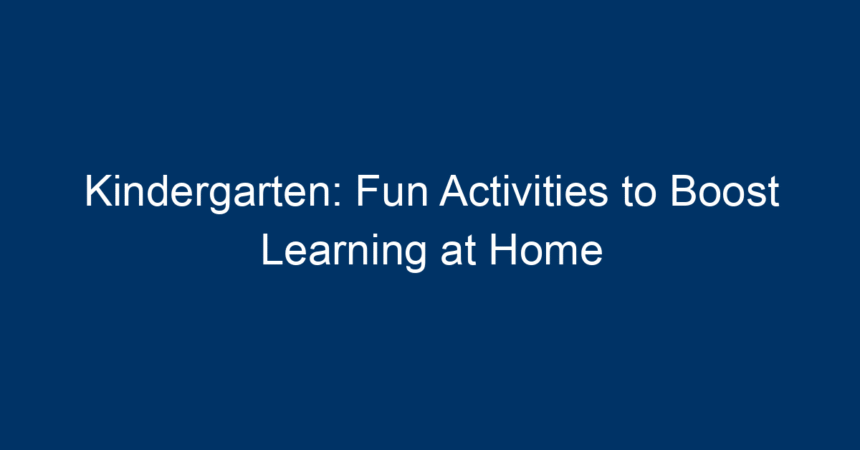Parenting during the kindergarten years can be both a rewarding and challenging experience. It’s a crucial time in a child’s development, where they begin to explore early learning essential for their academic journey. Fortunately, boosting learning at home doesn’t have to be a tedious task. With engaging activities, you can foster creativity, critical thinking, and a love for learning that will last a lifetime. In this article, we’ll uncover fun activities that make learning enjoyable, ensuring that kindergarten practitioners at home can thrive.
The Importance of Learning Activities in Kindergarten
Why Learning at Home Matters
The transition from home to school is significant in a child’s life. By integrating fun learning activities at home, you create a seamless connection between these environments. Research shows that children who engage in educational activities outside school tend to perform better academically.
Boosting Cognitive Development
Cognitive skills like memory, problem-solving, and logical reasoning are vital in kindergarten. Engaging children in playful yet educational activities fosters these skills. As they explore and discover, they build a foundation for future learning.
Fun and Educational Activities for Kindergarten at Home
1. Literature Exploration
Reading together can be one of the most enriching activities for kindergarteners.
Activities to Try:
- Storytime with a Twist: Choose a favorite book and pause to ask predictive questions. What do you think will happen next? This helps develop critical thinking.
- Create a Story Map: After reading, draw a map of the story’s events. It visualizes their understanding and reinforces narrative structure.
2. Creative Arts and Crafts
Art is not just about creativity; it’s also a fantastic learning tool.
Activities to Try:
- Nature Collages: Collect items like leaves, flowers, and twigs to create a collage. This encourages exploration and fine motor skills.
- DIY Storybooks: Ask your child to illustrate their favorite story or create a new one. This combines writing and art, enhancing their imaginative skills.
3. Math in Everyday Life
Mathematics can be fun and relevant to daily activities.
Activities to Try:
- Grocery Shop Counting: Make a shopping list and have your child count items as you shop. This helps instill basic math skills in real-life scenarios.
- Shape Hunts: Go on a "shape hunt" around the house or neighborhood, identifying different shapes. Creating a scrapbook of shapes can be an added bonus!
4. Science Experiments at Home
Hands-on experiments can ignite a passion for science in your kindergarten child.
Activities to Try:
- Baking Soda Volcano: Mix baking soda and vinegar in a container to create a fizzy eruption, introducing basic chemical reactions.
- Plant Growth Observations: Plant seeds in small pots and have your child track their growth. This teaches patience and responsibility.
5. Music and Movement
Incorporating music into learning elevates engagement levels significantly.
Activities to Try:
- Musical Chairs with Alphabet: Play the classic game, but assign letters to chairs. When the music stops, the child must say a word that starts with the letter on their chair.
- Dance Party with Counting: Create a playlist and count the number of jumps or spins during songs, integrating physical activity with numbers.
6. Interactive Technology Use
Technology can be a double-edged sword, but when used wisely, it can enhance learning.
Activities to Try:
- Educational Apps: Numerous apps help children with reading, writing, and math. Establish a balanced screen time routine where educational content is prioritized.
- Virtual Museum Tours: Explore the world’s best museums online. Choose one and discuss what you learned afterward.
Sensory Play: A Pathway to Learning
What is Sensory Play?
Sensory play involves activities that stimulate a child’s senses. It’s vital for cognitive and motor skill development in kindergarten.
Activities to Try:
- Sensory Bins: Fill bins with materials like rice, beans, or water beads. Hide items inside for your child to find and identify.
- Play Dough Creations: Encourage your child to mold playdough into letters, numbers, or shapes, building fine motor skills and creativity.
Importance of Outdoor Learning
Don’t underestimate the power of outdoor play! Nature is the perfect classroom.
Activities to Try:
- Nature Scavenger Hunt: Create a list of items to find outside, such as a round stone or a yellow flower. This promotes observation skills and gets them moving.
- Building Forts: Use sticks, leaves, and blankets to construct forts, fostering imaginative play and engineering concepts.
Incorporating Life Skills into Learning
The Value of Practical Skills
Incorporating everyday tasks into learning can reinforce education while teaching life skills.
Activities to Try:
- Cooking Together: Follow a simple recipe where your child can measure ingredients, teaching fractions and following directions.
- Gardening: Involve your child in caring for plants. They’ll learn responsibility and biology concepts while spending time outdoors.
Connecting with Other Families
Why Community Matters
Engaging with other families helps foster a sense of community and shared learning.
Activities to Try:
- Playdates with a Purpose: Host themed playdates focused on specific learning goals, like science or art.
- Parent Workshops: Join local or online workshops that focus on kindergarten education techniques, sharing insights and resources.
Conclusion: Make Learning Fun
Incorporating fun activities into your kindergarten home environment is essential for boosting your child’s learning and development. From engaging in arts and crafts to exploring the world around them, every moment is an opportunity for growth. Remember, the goal is to make these experiences enjoyable and enriching, ensuring that your child remains excited about learning.
To get started, choose a few activities from this article and engage with your little one. By fostering a loving and educational atmosphere at home, you’ll lay down a solid foundation for lifelong learning. Happy learning!




